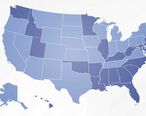New Book Shows How Improving Human Connections Can Lengthen Life
Gunning to join the club of centenarians?
Science writer Marta Zaraska argues in her new book that the single most important thing you can do is not daily exercise nor eating superfoods—it’s being connected to other people and your community.

Gunning to join the club of centenarians?
Science writer Marta Zaraska argues in her new book, Growing Young: How Friendship, Optimism, and Kindness Can Help You Live to 100 , that the single most important thing you can do is not daily exercise nor eating superfoods—it’s being connected to other people and your community.
It’s not just a hunch. The book reviews a wide array of medical research in defense of its rather unconventional claim.
One aspect, Zaraska argues, is evolutionary. In the early days of humanity, being alone was rare, and when it happened it meant one had to remain highly vigilant, on guard for impending dangers. Safety was found in numbers. Zaraska cites theories that consider humans to be innately social creatures—for whom isolation can take tolls on both mental and physical well-being.
These days, she explains, stress hormones are activated much more often than they used to be—by everything from finances, to traffic, to emails. When we’re chronically stressed as well as isolated, it’s hard to keep these hormones in check—and they can have detrimental effects on our body, including increased risk of diabetes and heart disease.
Certainly, exercise and healthy eating can help counteract these types of hormones. But few things are more effective, Zaraska argues, as the “social hormones” that get released into the body when we are with others: including serotonin, oxytocin, endorphins, and vasopressin.
When asked what they’re doing to increase their longevity, most Americans admit going to great lengths to stick to complex diets or grueling workout regimes. Zaraska wrote the book when she realized that these answers were out of step with more robust research suggesting that things like nurturing friendships, volunteering, and doing acts of kindness were both far more important.
Of course, the pandemic has made it hard to keep up connections with others, leading many to face prolonged isolation in their homes. Especially as many communities face winter weather and gathering outside at a safe distance remains difficult, rates of social isolation are at an all-time high.
Zaraska recommends looking for ways to remain connected with others through technology. In particular, she suggests finding avenues for civic engagement—through virtual volunteer work or participation in a community organization.
The book’s findings may not come as a surprise to many who already value the connection and relationships they have with loved ones in their lives. But by laying out the science to back it up—including data specifically linking human connection to longevity and healthy aging—the book comes as a helpful reminder at a moment when preventing isolation requires a bit of extra effort.
The book suggests: it’s worth it.














There are no comments for this article yet. Be the first to leave a comment